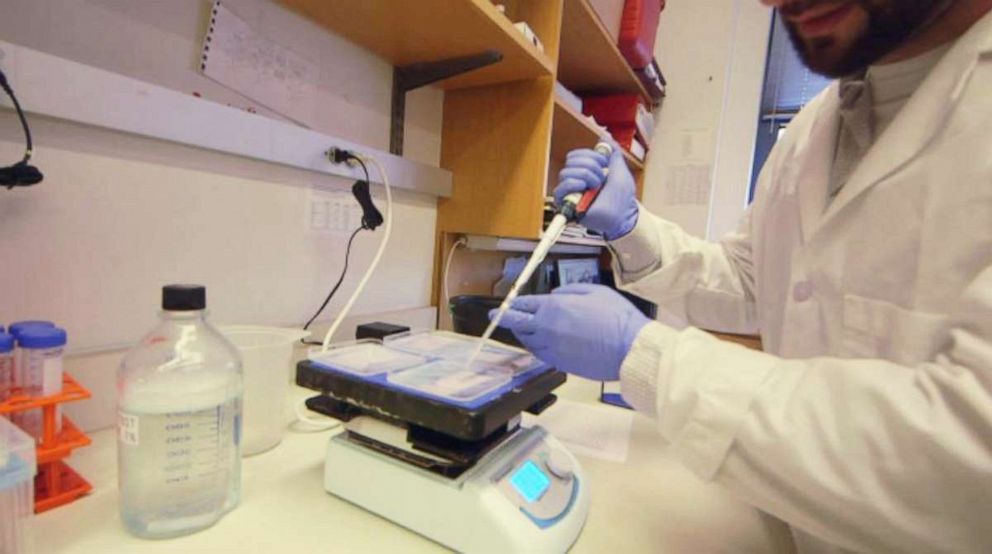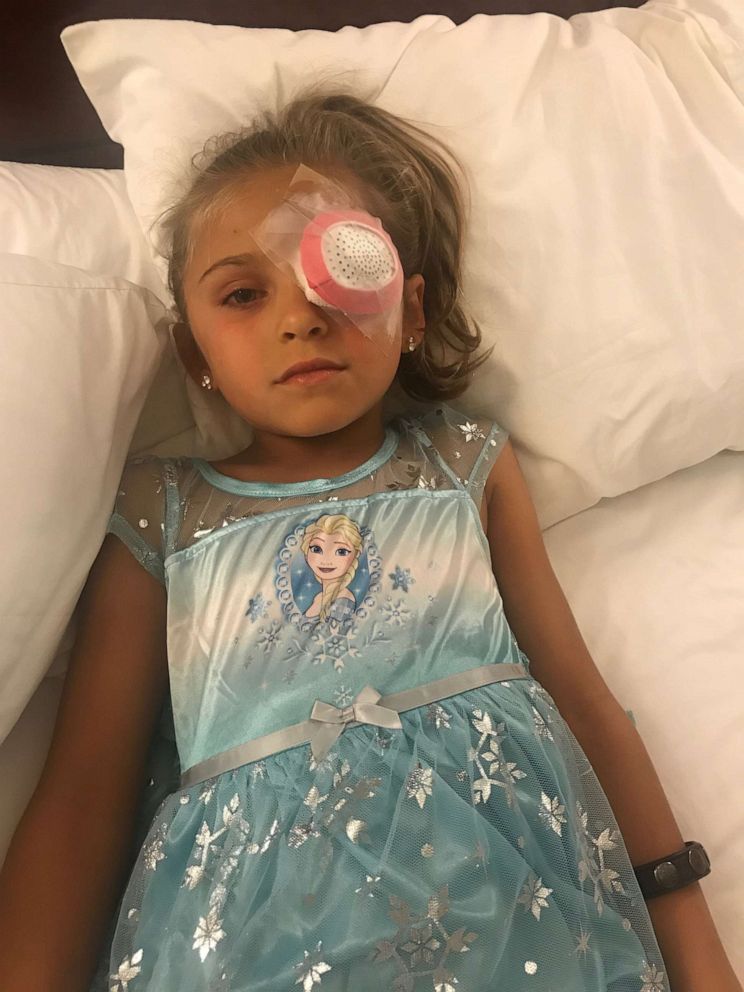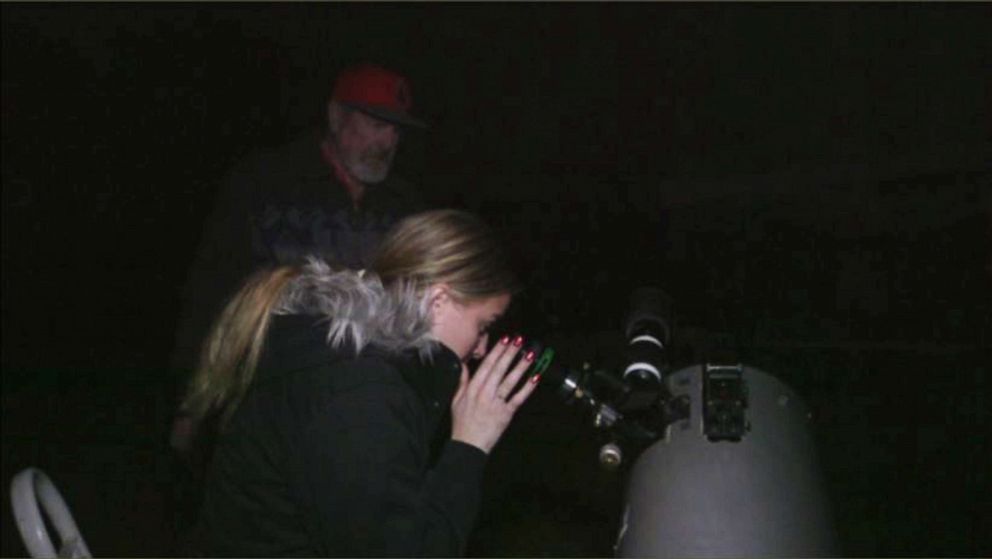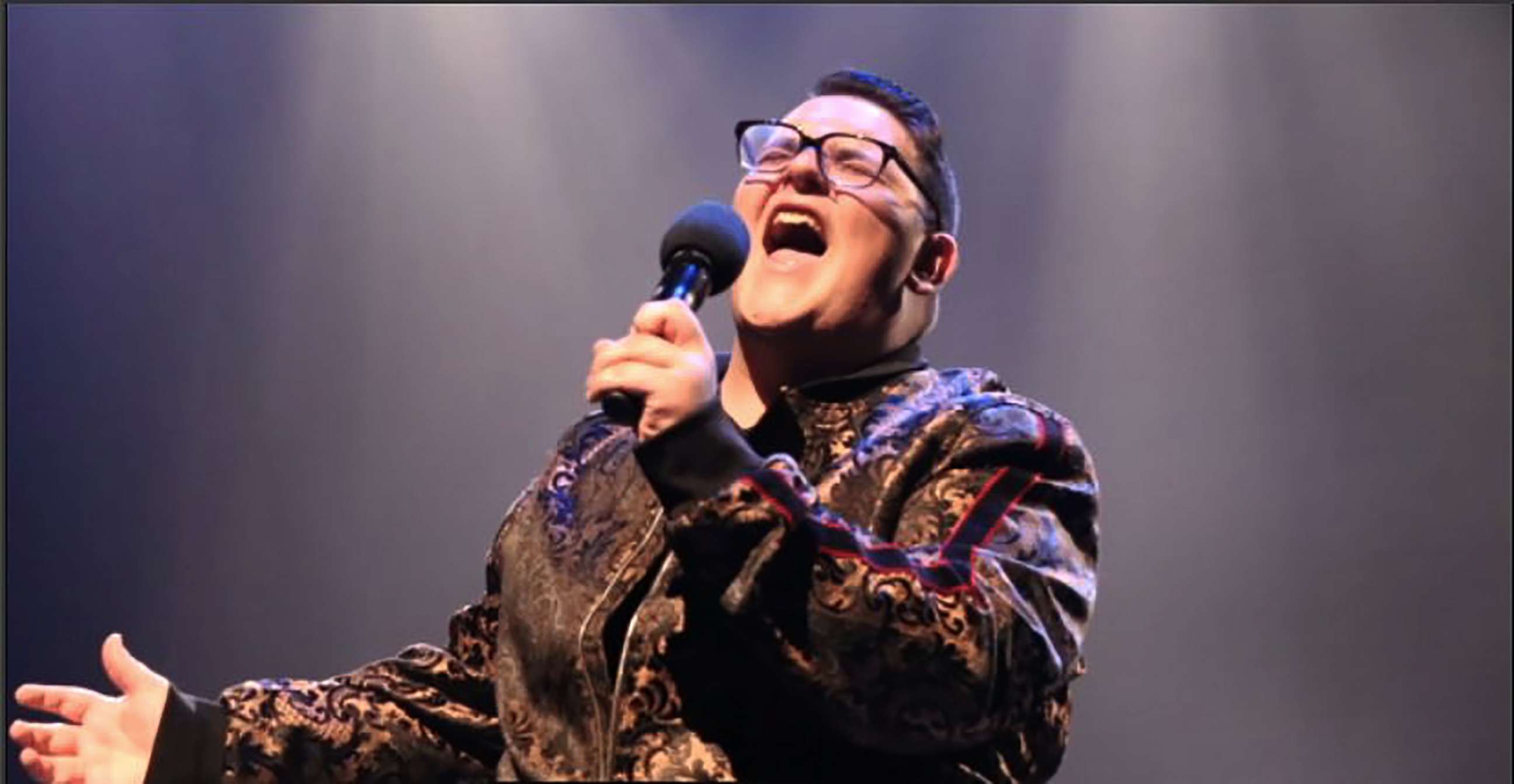Gene therapy gives people with inherited eye disease a new perspective on life
Luxturna is a breakthrough treatment for people with congenital eye disease.
For most of her life, Heather Hodlin’s eyesight would fade with the day. By nighttime, she was almost completely blind.
Everything was clearer in the daytime, but still, she struggled — unable to see areas that were shaded by trees or buildings. She could see at night if the lights were on inside her home, but they remained fuzzy — she still couldn’t make out the features on her fiance’s face or the color of his eyes.
Regardless of the time of day, Hodlin, 25, used to have to tap her foot in front of her to prevent herself from falling or colliding with objects. She also has a guide dog named Luna who helps her navigate everyday life.
“I've been told all my life [that] my vision is going to go,” Hodlin told “Nightline,” adding that she feared the day that she would go completely blind. “It's happening and I get really scared.”
Hodlin has Leber congenital amaurosis (LCA), a rare genetic disease that typically affects the retina and begins in infancy, causing severe visual impairment that experts say deteriorates slowly over time. It occurs in two to three out of 100,000 newborns, according to the National Institutes of Health.
Hodlin and her guide dog Luna were often spotted walking around the University of San Diego (USD) campus, where she had studied for a bachelors degree and participated in rowing. Hodlin said she has always wanted to be an astrophysicist. However, activities such as stargazing have become increasingly difficult as her vision has worsened.

But there is hope for Hodlin and others who deal with the congenital disease.
In January 2018, Hodlin said her father called to tell her that he had been watching the news where they had reported on the first FDA-approved gene therapy for patients with inherited retinal disease, called Luxturna.
LCA is caused by mutations in both copies of a particular gene that allows people to see properly. The therapy works by introducing a functional copy of these genes to patients’ retinal cells, which allows them to function properly.
Hodlin said she didn’t initially think the new treatment was for her disease, but that she learned it was for the group of retinal diseases for which her LCA is included after reading more about it.
“I kept looking and I was really nervous, but I got on the phone with my eye doctor at USD to figure out if it was for me,” she said.
Doctors first had to determine if Hodlin had a form of LCA that could be treated by Luxturna, which only works on people with mutations in the RPE65 gene. So, Hodlin underwent genetic testing in spring 2018, and three weeks later, she received the email that would change her life forever.

“I was reading [the results] and I read RPE65, and then I just started bawling my eyes out crying,” Hodlin said of the moment she learned that she was a candidate for Luxturna. “I was trembling. I was so happy.”
Dr. Aaron Nagiel, of the Children’s Hospital of Los Angeles (CHLA), is one of the few doctors in the United States qualified to perform the gene therapy, which requires an injection administered by a surgeon experienced in intraocular surgery. The hospital is one of only eight in the country that are allowed to deliver the treatment.
The treatment requires two separate operations: one eye is treated the first week and the second eye is treated the following week. The entire treatment with recovery time could take up to six months.
“We make small incisions on the front part of the eye, go into the eye [and] clean out the vitreous gel, which is this gel-like substance that fills the eye,” Nagiel told “Nightline.” “We then use a very fine needle to deliver a small amount of medicine underneath the retina.”
Nagiel said that there’s no room for error when performing the surgery because the retina is only a quarter of a millimeter thick. Any mistake could result in permanent damage to the retina, he said.
“Even a small [hand] tremor can make a big difference in delivering this medicine in the right location,” Nagiel said.
There are varying levels of success to the treatment, Nagiel said, with younger patients often showing the best results since the disease has had less time to progress.

At least 37 people received Luxturna treatment in 2018 and a majority of them saw improvements within a month, Nagiel said.
One of those patients is 6-year-old Monroe Le, who was diagnosed with LCA when she was 3. Since she received treatment from Nagiel in 2018, she has seen massive improvements in her quality of life, according to her mother, Heather Le.
Le told “Nightline” that when the family went on a recent trip to Disneyland, it was like the little girl was seeing it all for the first time.
“It’s like it’s a new place,” Le said. “She sees things for the very first time that have been here for years and years, so it’s such a special experience.”
Hodlin’s surgery took place in December 2018 at CHLA. She said it went off without a hitch but that the initial results worried her. In the first few days after the operation, she said that her vision became worse than ever — it was blurrier than before she had the surgery and her depth-of-field was practically nonexistent. Hodlin said she began to question whether it was worth getting the treatment.
Within weeks, however, Hodlin said her vision improved beyond expectation. She said her sight is still far from perfect but that she now notices details she never could before — from the red light blinking on a smoke detector in her bedroom to the white foam atop the ocean’s waves at night. The aspiring astrophysicist said she even recently saw her first star through a telescope.
That said, Hodlin and other Luxturna patients are expected to see their doctors for routine check-ups as the treatment is still relatively new and experts are unsure how long the results will last or if they are permanent.
Christian Guardino was 12 years old when his mother volunteered him to be one of the first patients to undergo the treatment during a clinical trial with Luxturna’s creators, Drs. Jean Bennett and Albert Maguire.

“I think some of my first memories of blindness and really knowing that I had a problem was when I was maybe around 4 or 5 years old,” Guardino, who is now 19 years old, told “Nightline.” “My cousins would always play outside. Even at nighttime, they'd play things like manhunt, running around, doing whatever kids do and I remember not being able to do that.”
Guardino said that, before the treatment, he couldn’t navigate outdoors once the sun went down.
“I would have to sit inside with light,” Guardino said. “Or if it was an outdoor party, I'd have to sit outside next to my parents.”
Guardino, who underwent the surgery when he was 13, said one of the first things he remembered was “seeing my parents face in detail…that was pretty incredible.”
Guardino told “Nightline” that he tries to forget what life was like before Luxturna but added that his poor vision inspired an early passion for music.
“I've been singing for my whole entire life — that's all I remember,” Guardino recalled. “I didn’t have good eyesight, but...I could hear music, and music was so important to me.”
In 2017, Guardino competed in “America’s Got Talent,” where he earned the “Golden Buzzer” from judge Howie Mandel. The show often referenced Guardino’s story, telling viewers how he was one of the first to undergo the gene therapy.

Guardino has also performed several times at the iconic Apollo Theater in New York City, and recently, he teamed up with country music singer and songwriter Hunter Hayes for help on his latest single, “Waiting,” which was released in March 2019.
“I feel blessed,” Guardino told “Nightline.” “You know, I wanted to forget what it was like before the gene therapy, because now I'm so lucky to have what I have. I work to use all the sight that I have today. I'm lucky to have all the vision that I have today.”
While Luxturna sounds like a dream come true for those suffering from LCA, the treatment comes with a hefty price tag.
“We announced a list price of $425,000 per vial and there is a vial required for each eye,” said Jeff Marrazzo, CEO of Spark Therapeutics, which bought Luxturna in its infancy.
Marrazzo told “Nightline” that although it’s expensive, patients with health insurance often pay only a fraction of the price. None of the patients interviewed by "Nightline" paid the full price for their treatment.
Hodlin said that she continues to see improvement in her vision.
“I don't want my vision to stop me from doing anything,” Hodlin said. “It's not going to stop me. I don't want to miss out on anything. I want to have just as much fun as everybody else. I just want to enjoy it…enjoy life.”



